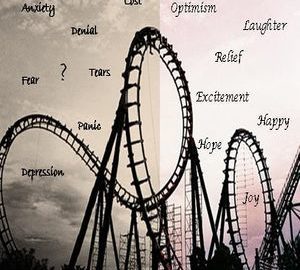If you have ever been diagnosed with cancer or any other chronic illness, you know exactly how you felt the moments you heard those words. I’ll never forget sitting in my doctor’s office, hearing her say the results were positive; you have cancer. I cannot describe to you the many emotions I felt at that very moment. Shock, disbelief, denial, fear, anger, guilt, sadness, and loneliness were all experienced at the same time. The days and weeks following were all filled with these same strong emotions and I quickly learned that all of these were ok. It was a normal part of the experience to feel this way. Yet, how does someone cope will all this emotion at once?
I’ve gone through difficult times before but this time, those same coping mechanisms weren’t as helpful. Yet, I tried to remain open. I’m the kind of person that needs to have as much information as possible. This helps me to feel like I am in control. So, I read a lot. Researched a lot (although Dr. Google is not the best method!). I hired a coach and journaled about my thoughts and feelings, but most importantly, I talked with people. I reached out to a few friends that had cancer and even someone I didn’t know but who had gone through the same thing as me. When I was feeling physically stronger, I talked with 3 different social workers and thankfully, my family and close friends were always there to listen anytime I needed.
I think the thing I found most difficult was dealing with the feelings of loss. I didn’t realize it at first but I was grieving; grieving the loss of body parts, the loss of my health, the loss of mobility I had initially from my surgeries and complications, and the loss of the life I once knew.
Finding Gratitude
One of the things that I needed to learn and accept was that my life was never going to be the same again. At first, this was very difficult. I tried to deny that I had cancer at all, especially since I didn’t need any treatment. I thought, once my body was healed physically, my life would pick up and continue on from where it left off. I quickly learned that that was never going to happen. This experience had changed me, forever. So, I mourned what I had lost but also realized I had much to be grateful for. I needed to make some serious changes and unfortunately, I needed to experience this crisis in order to make those changes. So, as difficult as this has been, I am truly grateful for what I have gained in the process.
What I’ve Learned through Crisis and Trauma
Whether you’ve experienced cancer or not, change, loss and transition can be difficult. Here’s what helped me. Hopefully, these tips will be helpful to you as well.
- Gratitude – Be grateful for the people who love and support you. For what you have in your life and who you are as a person. Keep a gratitude journal and write in it everyday.
- Self-Awareness – Be open to learning and understanding more about yourself, who you are and what you need.
- Assistance – Don’t be afraid to ask for help when you need it. You don’t, and shouldn’t need to do this alone.
- Control – Take back your control. Find ways or things where you can be in control and create your own level of certainty and power.
- Goal Setting and Accountability – Make a plan of what you can and want to do everyday. Even if it’s something very small like taking a walk. Accomplishing goals creates empowerment.
- Share Your Feelings – Have an outlet to express your feelings. For me, journaling was very helpful.
- Self-Care – Establish a self-care routine. For me, this included meditation, journaling, proper nutrition, rest, coaching and counselling, and when I was able, exercising.
- Get help and support. Hire a coach, work with a counsellor or therapist and share your feelings. Wellspring is a fabulous organization that provides free programs, services and support groups for patients, caregivers and family members who have or had cancer. Don’t resist. Lean into the supports that are available to you.
- Patience is a Virtue – This was not easy for me but I learned (and still learning) to be patient – with myself, the situation, and others.
- Practice Self-Compassion – Learn to love and accept yourself for who you are at this present moment. Talk to yourself the same way you would to someone you love.
- Trust – Trust in the power of time and know that although things have changed, things will also get better. Trust yourself to know you are stronger than you think. Trust in the power of love that will help you through this dark time. And trust that change doesn’t have to be bad.
- Be Present – Most of us live in the past or the future. This is where fear and uncertainty reside. It’s hard not to go there but when you can, bring yourself back to the present moment. Meditation and mindfulness are both practices that can help you focus on the present.
I’m sure there are others that can be added to this list but if you are going through a rough time whether that be health related or not, take solace in the above. Find one thing that resonates with you and do it.
Going through change – any change, is difficult. Talking about it, especially with someone who has been there and helping you work through next steps is critical. If I can help in anyway, please reach out. I look forward to speaking with you.
Until next time.

